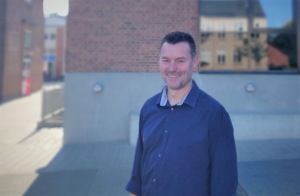News
Finding the missing link in Fehmarn country
This article is more than 4 years old.
The new English-language public school Lolland International School will greatly enhance the region’s recruitment prospects ahead of the ten-year construction of a new road and rail line linking Germany to Scandinavia

Dominic Maher
Lolland International School, a new international public school located on one of Denmark’s two most southerly islands, isn’t making any bold claims. For example, it doesn’t promise it has the best teachers. Or the best facilities.
But it does have the best views and very possibly the freshest air. And in ten years’ time, it will be the closest Danish international school to the German border.
By 2030, according to most prognoses, the Fehmarn link will be in operation, thus dramatically reducing the travel time by train between Berlin and the Scandinavian capitals of Copenhagen, Sweden and Oslo.
A decade of toil requires vast numbers of foreign workers, and the team behind Lolland International School have done the maths. The children who relocate with their parents to fulfil Fehmarn will need a school, and Lolland International School will fill the void.
From provincial to pivotal
Lolland-Falster, twin islands at the southerly point of Denmark, are perhaps best known in Denmark for the quiet life they offer. Only Bornholm has a lower crime rate, and the islands only ever truly come alive during the tourism season in the summer.
To most Danes, they are a passing curiosity as they pass through them on their way to catching the Rostock ferry from the Danish port of Gedser. Somewhere there is a safari park with retired elephants, they remember, and a hotel featured in a famous TV series.
But Lolland International School is well placed to witness a significant decade in the islands’ development, which is forecast to greatly accelerate in the build-up to the opening of the link.
Free, bilingual program
Based in Maribo, the second largest town on Lolland, the school has wasted no time since announcing its plans late last year. It has already launched a website (lollandinternationschool.dk), obtained Cambridge Curriculum certification, and held various parent and community information meetings.
It has appointed Dominic Maher, the former vice-principal of Skt Josef’s International School in Roskilde, as headteacher, and it plans to open in August 2021.
“In the spring, we will be carrying out some light renovations to our school building where we have space for 100 students. We will also be recruiting new and experienced teachers, holding various open-house evenings, and opening up for student enrolment,” Maher told CPH POST.
“We will be offering a free, bilingual program where half of the lessons will be taught in English and the other half in Danish. Our aim is to provide quality education in an international setting that adequately prepares children for further study and life here in Denmark. We will open a school that fosters curiosity, develops resilience and connects with community.”
Call it the missing link
For the constructors of the Fehmarn Link, Lolland International School might not be the missing piece in the jigsaw, but it will provide an invaluable service.
The school’s existence will greatly enhance their efforts to recruit the international expertise they need to realise the project – as well as those of the outward-looking companies located on the islands.
“The Fehmarn tunnel link will undoubtedly bring in many new families, but there are other development projects coming that will attract foreign workers and their families too,” commented Maher.
“It is very important to establish a free, public, international school for these families whether they are here short-term or desiring to set up permanently in Denmark.”
Everyone is welcome
First priority will be given to non-permanent residents on the islands, thus safeguarding a place of education for their children.
And the pool of prospective parents does not end there, as many internationals are already based on the islands working at local companies, as well as Danes seeking a more worldly education for their children – if there are any remaining spaces available.
“The majority of our families will be new to Denmark, but we also have spaces for Danish families returning to Denmark as well spaces for some local families too. Everyone is welcome to contact me for further information,” confirmed Maher.
The decision to create an International School in Lolland was proposed by Lolland Municipality’s international school steering committee in conjunction with a recommendation from Globally Local. It was unanimously approved by the Lolland Municipal Council in June 2020.
Tool of integration
Lolland International School is not only a place of education, but a tool of integration. It is committed to helping newly-arrived foreign employees to settle in and make the best of their new surroundings.
A combination of events, networking and support services will keep the employees and their families informed about their community, leisure options and jobs – particularly with the accompanying spouse in mind.
“Lolland International School is an important piece in the strategic development of Lolland,” concluded Maher.
“Therefore we want a school with a global outlook that has strong ties to the local community and businesses.”










































